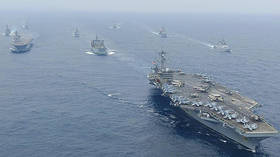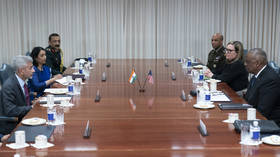US calls on Indian military to face ‘joint challenges’

The US wants India to play a more prominent security role in the Indo-Pacific region, in view of “challenges” that could require a “joint response” from the two countries, a Pentagon official told the PTI news agency in a lengthy interview on Sunday.
Washington is encouraging New Delhi to take on a "broader stabilizing role" and act as a “net security provider,” not just in the Indian Ocean but also in the Indo-Pacific region, the “senior defense official,” whose identity was not revealed, said.
The US military is particularly focused on “advancing interoperability” between the two nations’ forces through joint exercises, to make them “prepared for the kinds of challenges we will face in the future, which will require joint responses on both sides,” the official explained.
The Pentagon is particularly interested in “navy-to-navy” cooperation when it comes to the “operational front,” he added. The US also wants to enable “greater logistical and operational cooperation between our navies.”
The official stopped short of naming any specific “challenges” India might face, in which it could require US support. Neither did he describe how the two nations could respond to these “challenges.”
The areas in which the US seeks closer defense ties with India include support for the Association of Southeast Asian Nations (ASEAN) and “other kinds of multilateral settings,” including “even more informal” ones, the official said. Dialogue between the two powers also involves “emerging technologies in the domain of space and cyberspace.”
The US official went on to say Washington understands that “every country has a desire to have a strong domestic industrial base,” and that America is “always working very hard” to fill “our Indian friends’… requirements,” without providing any specifics.
The interview comes as Washington seeks to win over nations in the Indo-Pacific region amid continued tensions with Beijing. Relations between the US and China, which had already been fraught for several years, took a nosedive in August when US House Speaker Nancy Pelosi visited the self-governing island of Taiwan in defiance of Beijing’s warnings that the trip would embolden separatists in Taipei and undermine US-China relations.
China, which considers Taiwan a part of its sovereign territory, responded by severing military and climate ties with Washington. The relations between the two nations are further constrained by what the US calls freedom of navigation operations, during which it sends warships to the South China Sea. In August, two US cruisers sailed through the Taiwan Strait, separating the island from mainland China.














